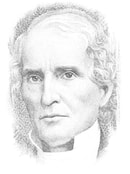Hosea
hosea 1
|
Hosea 2:14: Therefore, behold, I will allure her, and bring her into the wilderness, and speak comfortably unto her
|
|
 John Gill
John Gill
Therefore, behold, I will allure her
Since these rough ways will not do, I will take another, a more mild and gentle way; instead of threatening, terrifying, and punishing, I will allure, persuade, and entice, giving loving words and winning language: or "nevertheless", or "notwithstanding" so Noldius and others render the particle; though they have thus behaved themselves, and such methods have been taken with them to no purpose, yet I will do as follows: the words may be understood of the call and conversion of the people of God, the spiritual Israel of God, both Jews and Gentiles, in the first times of the Gospel, as ( Hosea 2:23 ) is quoted and applied by the Apostle Paul, ( Romans 9:24 Romans 9:25 ) and be understood also of the call of the believing Jews out of Jerusalem, before the destruction of it, ( Luke 21:21 ) , from whence they removed to Pella, as Eusebius relates: and of the apostles out of the land of Judea into the wilderness of the people, the Gentile world, to preach the Gospel there; where vineyards or churches were planted; the door of faith and hope, were opened to the Gentiles, that had been without hope; and the conversions now made, both among Jews and Gentiles, opened a door of hope, or were a pledge of the conversion of the Jew, and the bringing in of the fulness of the Gentiles in the latter day; to which times also these words may be applied, when the Jews shall be allured and persuaded to seek the Lord their God, and David their King, and join Gospel churches in the wilderness of the people, and shall have abundance of spiritual consolation and joy; and they may also be applied to the conversion of sinners in common, and set forth the methods of God's grace in dealing with them: there is throughout an allusion to Israel's coming out of Egypt, from whence the Lord allured and persuaded them by Moses and Aaron; and then brought them into the wilderness, where he fed and supplied them, and spoke comfort to them, and gave them the lively oracles; and whence, from the borders of it, they had and entered into the vineyards in the land of Canaan; and in the valley of Achor ate of the grain of the land, which was a door of hope to them they should enjoy the whole land; and when they rejoiced exceedingly, particularly at the Red sea, at their first coming out. The word rendered "allure" signifies to persuade , as in ( Genesis 9:27 ) and in conversion the Lord persuades men, not merely by moral persuasion, or the outward ministry of the word, but by powerful and efficacious grace; opening the heart to attend to things spoken, and the eyes of the understanding to behold wondrous things in the word of God; working upon the heart, and removing the hardness and impenitence of it; quickening the soul, drawing it with the cords of love, and sweetly operating upon the will: and on a sudden and unawares making the soul like the chariots of Amminadib, or a willing people; persuading it to true repentance for sin, to part with sins and sinful companions, and with its own righteousness, and to come to Christ, and to look to him, and lay hold on him as the Saviour, and to submit to his ordinances: moreover, the Lord persuades men at conversion of his love to them, and of their interest in Christ, and all the blessings of grace in him. Kimchi's note is,
``I will put into her heart to return by repentance;'' and compares with it ( Ezekiel 36:26 ) . The Targum is "I will subject her to the law.'' --John Gills Exposition of the Whole Bible
Since these rough ways will not do, I will take another, a more mild and gentle way; instead of threatening, terrifying, and punishing, I will allure, persuade, and entice, giving loving words and winning language: or "nevertheless", or "notwithstanding" so Noldius and others render the particle; though they have thus behaved themselves, and such methods have been taken with them to no purpose, yet I will do as follows: the words may be understood of the call and conversion of the people of God, the spiritual Israel of God, both Jews and Gentiles, in the first times of the Gospel, as ( Hosea 2:23 ) is quoted and applied by the Apostle Paul, ( Romans 9:24 Romans 9:25 ) and be understood also of the call of the believing Jews out of Jerusalem, before the destruction of it, ( Luke 21:21 ) , from whence they removed to Pella, as Eusebius relates: and of the apostles out of the land of Judea into the wilderness of the people, the Gentile world, to preach the Gospel there; where vineyards or churches were planted; the door of faith and hope, were opened to the Gentiles, that had been without hope; and the conversions now made, both among Jews and Gentiles, opened a door of hope, or were a pledge of the conversion of the Jew, and the bringing in of the fulness of the Gentiles in the latter day; to which times also these words may be applied, when the Jews shall be allured and persuaded to seek the Lord their God, and David their King, and join Gospel churches in the wilderness of the people, and shall have abundance of spiritual consolation and joy; and they may also be applied to the conversion of sinners in common, and set forth the methods of God's grace in dealing with them: there is throughout an allusion to Israel's coming out of Egypt, from whence the Lord allured and persuaded them by Moses and Aaron; and then brought them into the wilderness, where he fed and supplied them, and spoke comfort to them, and gave them the lively oracles; and whence, from the borders of it, they had and entered into the vineyards in the land of Canaan; and in the valley of Achor ate of the grain of the land, which was a door of hope to them they should enjoy the whole land; and when they rejoiced exceedingly, particularly at the Red sea, at their first coming out. The word rendered "allure" signifies to persuade , as in ( Genesis 9:27 ) and in conversion the Lord persuades men, not merely by moral persuasion, or the outward ministry of the word, but by powerful and efficacious grace; opening the heart to attend to things spoken, and the eyes of the understanding to behold wondrous things in the word of God; working upon the heart, and removing the hardness and impenitence of it; quickening the soul, drawing it with the cords of love, and sweetly operating upon the will: and on a sudden and unawares making the soul like the chariots of Amminadib, or a willing people; persuading it to true repentance for sin, to part with sins and sinful companions, and with its own righteousness, and to come to Christ, and to look to him, and lay hold on him as the Saviour, and to submit to his ordinances: moreover, the Lord persuades men at conversion of his love to them, and of their interest in Christ, and all the blessings of grace in him. Kimchi's note is,
``I will put into her heart to return by repentance;'' and compares with it ( Ezekiel 36:26 ) . The Targum is "I will subject her to the law.'' --John Gills Exposition of the Whole Bible
|
Hosea 2:15:
And I will give her her vineyards from thence, and the valley of Achor for a door of hope: and she shall sing there, as in the days of her youth, as in the day when she came up out of the land of Egypt |
Vineyards from the wilderness? Out of out experiences and weariness, and seeming failure God can make, even these, fresh sources of refreshing and strength. “Valley of Achor”=trouble or tremblin
|
|
Hosea 2:16:
And it shall be at that day, saith the Lord, that thou shalt call me My Husband, and shalt call me no more My lord |
"My Husband" is something deeper and sweeter than the mere formal designation “my Lord.” God is pledging to act on behalf of His people as a husband.
|
|
Hosea 3:5:
5 Afterward shall the children of Israel return, and seek the Lord their God, and David their king; and shall fear the Lord and his goodness in the latter days. |
 Michael Reeves Michael Reeves
The right fear of God is, quite explicitly, a blessing of the new covenant. Speaking of the new covenant, the Lord promised through Jeremiah: “I will give them one heart and one way, that they may fear me forever, for their own good and the good of their children after them. I will make with them an everlasting covenant, that I will not turn away from doing good to them. And I will put the fear of me in their hearts, that they may not turn from me” (Jer. 32:39–40).
In Jeremiah 33, the Lord goes on to explain the nature of this new covenant fear in words so striking they overturn all our expectations. He promises: “I will cleanse them from all the guilt of their sin against me, and I will forgive all the guilt of their sin and rebellion against me. And this city shall be to me a name of joy, a praise and a glory before all the nations of the earth who shall hear of all the good that I do for them. They shall fear and tremble because of all the good and all the prosperity I provide for it” (Jer. 33:8–9, emphasis added). This is not a fear of punishment—of what God might do if His people turn away from Him. Quite the opposite: in Jeremiah 33, the Lord reeled off a catalog of pure blessing. He would cleanse them, forgive them, and do great good for them. And they fear and tremble precisely because of all the good He does for them. Here is not a fear that stands on the flip side of the grace and goodness of God. It is the sort of fear Hosea describes when he prophesies how “the children of Israel shall return and seek the Lord their God, and David their king, and they shall come in fear to the Lord and to his goodness in the latter days” (Hos. 3:5, emphasis added). It is a fear “to the Lord and to his goodness.” --Michael Reeves; Ligoniers; What is the Fear of God? 9.14.23 |
|
Hosea 4:6:
My people are destroyed for lack of knowledge. Because you have rejected knowledge, I also will reject you from being priest for Me; Because you have forgotten the law of your God, I also will forget your children. |
God told Hosea that "My people perish for lack of knowledge," and it would be wise to presume He knew what He was talking about. Simply, we can't defend what we do not know. A teacher cannot explain the theological basis for all truth and reality, if he himself does not know the very nature of the finite yet personal God of all truth and reality.
|

Hosea 4:6 declares, “For my people perish for lack of knowledge.” In order to actively address today’s issues, it is absolutely critical that we are prepared, both spiritually and intellectually. Take the time to educate yourself on the laws, procedures and government systems that affect both you and your family. However, it is just as important to equip yourself with Scriptures that will assist you in learning strategies that respect government while actively advocating against injustice and violence. Throughout the Bible, Jesus teaches us the importance of knowing your rights as both citizens of your home country and citizens of God’s kingdom. (Matthew 22:15-22, Luke 4:38-53, Mark 3:1-6) It is imperative that you know your rights in order to prevent them from being violated. -Allen Reynolds; HOW TO PUT YOUR FAITH TO WORK IN RESPONSE TO TODAY’S VIOLENCE
|
Hosea 4:14:
I will not punish your daughters when they commit whoredom, nor your spouses when they commit adultery: for themselves are separated with whores, and they sacrifice with harlots: therefore the people that doth not understand shall fall. |
The Bible warns against prostituting their daughters (Lev 19:29); priests were not allowed to marry anyone who had been a prostitute (Lev 21:7). A priests daughter who became a prostitute was to be executed for so degrading her family (Lev 21:9). A prostitutes income could not be used for paying vows, i.e, as a receipt in the Temple (Deut 23:18). Decrees of expulsion for prostitutes occur in Israels history, and toleration of prostitution was declared to be a sign of approaching judgment and collapse.
|
|
Hosea 8:4:
They set up kings, but not by Me; They made princes, but I did not acknowledge them. From their silver and gold They made idols for themselves— That they might be cut off. |
|
| Yet although here, as everywhere, man's self-will was overruled by God's will, and fulfilled it, it was not the less self-will, both in the ten tribes and in Jeroboam. It was so in the ten tribes. For they cast off Rehoboam, simply of their own mind, because he would not lessen the taxes, as they prescribed. If he would have consented to their demands, they would have remained his subjects 1 Kings 12:4. "They set up kings, but not by or through" God, whom they never consulted, nor asked His will about the rules of the kingdom, or about its relation to the kingdom of Judah, or the house of David. They referred these matters no more to God, than if there had been no God, or than if He interfered not in the affairs of man. It was self-will in Jeroboam himself, for he received the kingdom (which Ahijah told him, he "desired") not from God, not requiring of him, how he should undertake it, nor anointed by Him, nor in any way acknowledging Him, but from the people. And as soon as he had received it, he set up rebellion against God, in order to establish his kingdom, which he founded in sin, whereby he made Israel to sin. --Barnes Notes |
|
Hosea 10:12:
Plant goodness, harvest the fruit of loyalty, plow the new ground of knowledge |
|
|
Hosea 11:4:
I led them with cords of kindness, with the bands of love, and I became to them as one who eases the yoke on their jaws, and I bent down to them and fed them.” |
BIBLE VERSE OF THE DAY: THE UNFAILING MERCY OF GOD The book of Hosea is a profound narrative that vividly illustrates the unfailing mercy of God and how He relentlessly pursues you and I. “I led them with cords of kindness, with the bands of love, and I became to them as one who eases the yoke on their jaws, and I bent down to them and fed them.” Hosea 11:4 This verse, embodying the unfailing mercy of God, and poignantly depicts God’s compassionate and persistent love, even in the face of rebellion and waywardness. (Christian Learning 3/1/24) READ MORE>>>>> |












